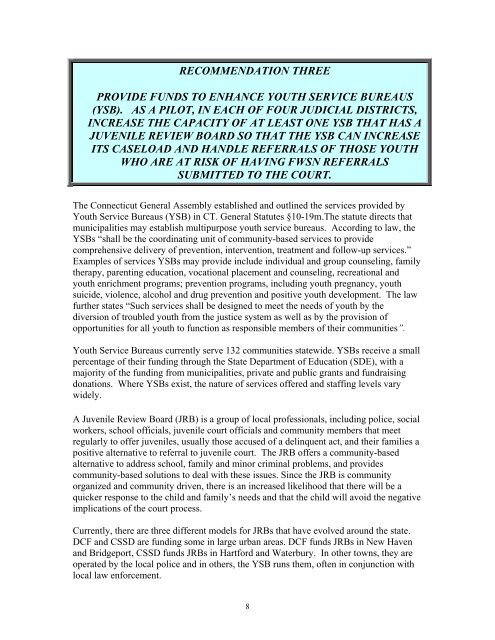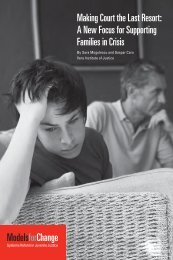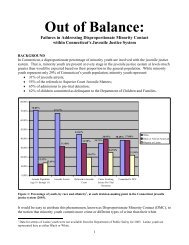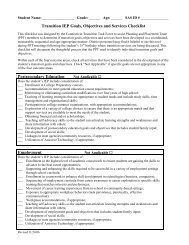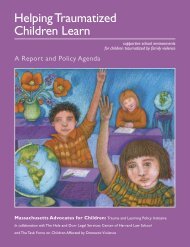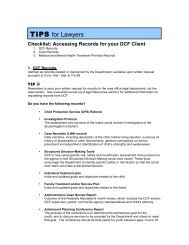FWSN-advisorybd-repo.. - The Connecticut Juvenile Justice Alliance
FWSN-advisorybd-repo.. - The Connecticut Juvenile Justice Alliance
FWSN-advisorybd-repo.. - The Connecticut Juvenile Justice Alliance
Create successful ePaper yourself
Turn your PDF publications into a flip-book with our unique Google optimized e-Paper software.
RECOMMENDATION THREE<br />
PROVIDE FUNDS TO ENHANCE YOUTH SERVICE BUREAUS<br />
(YSB). AS A PILOT, IN EACH OF FOUR JUDICIAL DISTRICTS,<br />
INCREASE THE CAPACITY OF AT LEAST ONE YSB THAT HAS A<br />
JUVENILE REVIEW BOARD SO THAT THE YSB CAN INCREASE<br />
ITS CASELOAD AND HANDLE REFERRALS OF THOSE YOUTH<br />
WHO ARE AT RISK OF HAVING <strong>FWSN</strong> REFERRALS<br />
SUBMITTED TO THE COURT.<br />
<strong>The</strong> <strong>Connecticut</strong> General Assembly established and outlined the services provided by<br />
Youth Service Bureaus (YSB) in CT. General Statutes §10-19m.<strong>The</strong> statute directs that<br />
municipalities may establish multipurpose youth service bureaus. According to law, the<br />
YSBs “shall be the coordinating unit of community-based services to provide<br />
comprehensive delivery of prevention, intervention, treatment and follow-up services.”<br />
Examples of services YSBs may provide include individual and group counseling, family<br />
therapy, parenting education, vocational placement and counseling, recreational and<br />
youth enrichment programs; prevention programs, including youth pregnancy, youth<br />
suicide, violence, alcohol and drug prevention and positive youth development. <strong>The</strong> law<br />
further states “Such services shall be designed to meet the needs of youth by the<br />
diversion of troubled youth from the justice system as well as by the provision of<br />
opportunities for all youth to function as responsible members of their communities”.<br />
Youth Service Bureaus currently serve 132 communities statewide. YSBs receive a small<br />
percentage of their funding through the State Department of Education (SDE), with a<br />
majority of the funding from municipalities, private and public grants and fundraising<br />
donations. Where YSBs exist, the nature of services offered and staffing levels vary<br />
widely.<br />
A <strong>Juvenile</strong> Review Board (JRB) is a group of local professionals, including police, social<br />
workers, school officials, juvenile court officials and community members that meet<br />
regularly to offer juveniles, usually those accused of a delinquent act, and their families a<br />
positive alternative to referral to juvenile court. <strong>The</strong> JRB offers a community-based<br />
alternative to address school, family and minor criminal problems, and provides<br />
community-based solutions to deal with these issues. Since the JRB is community<br />
organized and community driven, there is an increased likelihood that there will be a<br />
quicker response to the child and family’s needs and that the child will avoid the negative<br />
implications of the court process.<br />
Currently, there are three different models for JRBs that have evolved around the state.<br />
DCF and CSSD are funding some in large urban areas. DCF funds JRBs in New Haven<br />
and Bridgeport, CSSD funds JRBs in Hartford and Waterbury. In other towns, they are<br />
operated by the local police and in others, the YSB runs them, often in conjunction with<br />
local law enforcement.<br />
8


